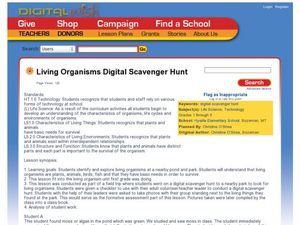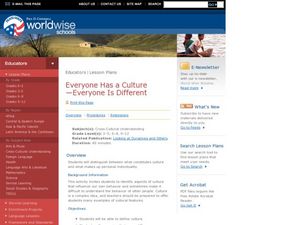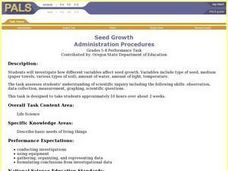National Wildlife Federation
Habitat Web
It's all connected. Classes create a web to connect living things in a local ecosystem. They create cards with both living and nonliving things found in their areas while considering the characteristics of each. After they have a good...
Population Connection
Meeting Human Needs
How to meet the needs of people around the globe—a question many ask. The fifth in a six-part series about human population and its effects on the globe, the eye-opening lesson includes discussion, a homework activity, and an in-class...
Curated OER
Animals and Their Needs
Students identify the characteristics of living things and examine objects to see if they are living. They identify the needs of living things, in particular of animals and animal babies. They discuss how to care for pets.
Curated OER
What Plants Need in Order to Survive and Grow: Light
Students conduct an experiment to evaluate whether plants need light to survive and grow. They observe and gather data about plant responses to different growth regimes, analyze the data, and make conclusions about basic plant needs.
Curated OER
Survivor!
Students, in groups, create a project to display examples and non-examples of basic needs. They answer what is needed for basic survival of all living things.
Michigan State University
May I Take Your Order?
If you're a pest, come and get a tasty meal here! Scholars work collaboratively to construct a mini restaurant out of a shoe box and create a menu that feeds a pest their favorite food.
Curated OER
Living On Earth
Learners discover the many different animals within various habitats and discover how each individual species interacts with its particular environment. Through charting different animals and their distinct habitat and matching animals...
Curated OER
Is It Alive?
First graders explore living things and their habitats. They create an original It's Alive! book to demonstrate what they have learned.
Curated OER
Culture Everywhere
Students study their culture while filling in a chart that shows how culture meets basic human needs. They examine the role of archaeologists in studying people from past cultures.
Curated OER
Animals
First graders study the basic needs of animals and compare them to human needs. They make bird feeders using milk carton and pine cones. They review the basic needs of food, water, air, and shelter and discuss what happens when animals...
Curated OER
Meeting Our Daily Needs
Students investigate the concept of basic needs. In this philanthropy lesson, students define the term "philanthropy" and brainstorm ways to help others who don't get their basic needs met. Students analyze and sort acts of philanthropy...
Curated OER
Lesson Plan on Wants and Needs
First graders examine and discuss the difference between what they need to live and what they want. They examine pictures from magazines and newspaper ads, distinguishing between whether they are wants or needs.
Curated OER
Habitat is Home
Students complete a picture to show things found in their homes. In this habitat lesson plan, students discuss and make a class picture of an animal habitat and its four basic needs. Students sing a song. Students create their own...
Curated OER
Learning About Animal Shelters for Earth Day
Students explore habitats. in this ecology and animal habitat lesson, students listen to the book A House is a House for Me by Mary Ann Hoberman. Students discuss the basic needs of animals and go on a nature walk to observe animal...
Curated OER
Living Organisms Digital Scavenger Hunt
Students photograph living organisms. In this plan for a field trip, students go to a local park or pond and photograph themselves with various living organisms on their scavenger hunt list. The photographs taken are compiled into a...
Curated OER
Everyone has a Culture-Everyone is Different
Young scholars explore cultural features. In this multicultural acceptance lesson, students define and discuss "culture," and distinguish the difference between individual characteristics and cultural characteristics. Young scholars...
Curated OER
Prairie In A Bottle
Second graders observe images of prairie ecosystems and discuss the needs of living things. They create a prairie habitat in a closed jar to observe the water cycle and plant growth.
Curated OER
Seed Growth
Students develop an independent procedure to investigate the germination of two types of seeds. Students must construct data tables or charts to record observations and results, graph the data, and analyze the data.
Curated OER
Hey Diddle Diddle
Students discuss their needs to grow and be healthy. They listen as the teacher explains the definition of "organisms" and "nonliving" Students identify organisms in the classroom. They listen to and view a poster illustrating the "Hey...
Curated OER
A Walk in the Forest
Students explore interrelationships among plants and animals. Students listen to Where to, Little Wombat? by Charles Fuge, and contribute words and phrases for a classroom animal and plant survival chart. Students take a walk in a...
Curated OER
Human Body Basics
In this human body worksheet, students are given clues to find hidden words in boxes. Topics include the human body systems, the components of living things and the building blocks of life.
Curated OER
Fun On The Farm
Students experiment with a variety of resources to study about sounds and their sources (weather, animal, and transportation). They compare size, structure, and basic needs of living things. Each student studies about farm animals,...
Curated OER
Plants Need Soil
Third graders identify what plants need to grow. In this agricultural lesson, 3rd graders read the book The Empty Pot and discuss the steps to take when planting a seed. Students plant a seed and water it each day. Students discuss their...
Curated OER
Scavenging the Sandy Shore
Students explore oceanography by examining a beach. In this living things lesson, students define the terms abiotic and biotic and practice identifying living and non-living things that have been previously found on a beach. Students...

























